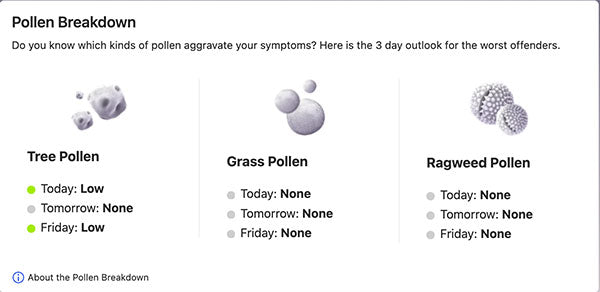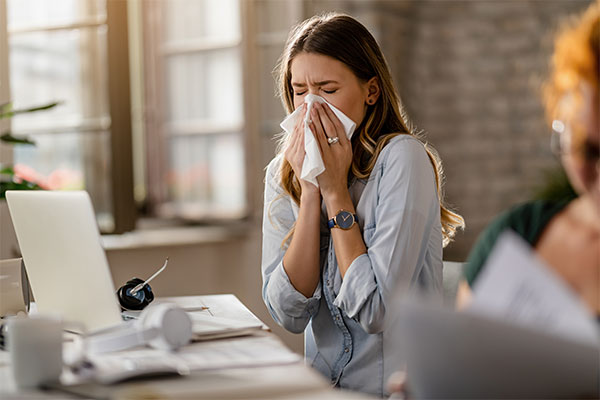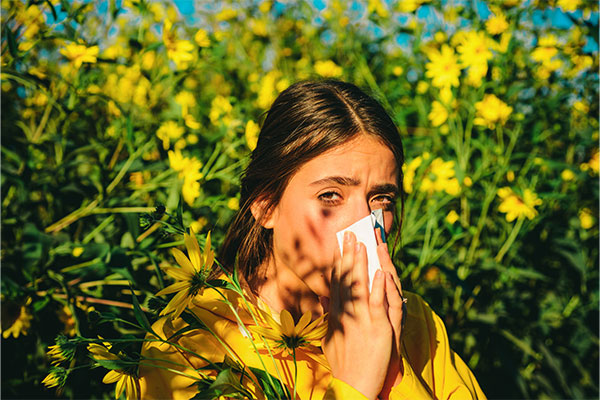Seasonal allergies like hay fever can be a real nuisance, affecting millions of people every year. The itchy eyes, runny nose, and sneezing can make it difficult to enjoy the beauty of the season. But fear not, there are natural remedies available that can help provide relief from hay fever symptoms. In this blog, we will explore the causes and symptoms of hay fever, understand the role of pollen in triggering allergic reactions, and discuss the efficacy of natural cures for hay fever. So, if you're tired of relying on medications and looking for more natural alternatives, keep reading. We've got you covered!
Understanding Hay Fever Seasonal Allergies
If you find yourself dreading the arrival of spring or summer because of hay fever, it's important to understand what exactly it is and how it affects your body. Hay fever, also known as allergic rhinitis, is an allergic reaction of the immune system to specific allergens. The most common triggers for hay fever include pollen, dust mites, and pet dander. When these allergens come into contact with the nasal passages, it triggers symptoms like sneezing, runny nose, and watery eyes. Hay fever can have a significant impact on the quality of life, making it crucial to find effective relief.
Decoding Hay Fever
Let's delve deeper into the world of hay fever and understand how it affects our bodies. Allergic rhinitis, commonly known as hay fever, is an allergic reaction of the immune system to specific allergens, such as pollen, dust mites, or pet dander. When exposed to these allergens, the immune system overreacts, releasing histamine and other chemicals that cause the characteristic symptoms of hay fever.
The symptoms of hay fever can significantly impact the quality of life for individuals affected by it. Sneezing, congestion, itchy and watery eyes, and a runny nose can make it difficult to go about daily activities. Fatigue and trouble sleeping due to nasal congestion can further worsen the effects of hay fever. Therefore, finding effective ways to manage hay fever symptoms is essential for improving the overall well-being of hay fever sufferers.

Differentiating Between Hay Fever and Other Allergies
While hay fever falls under the category of seasonal allergies, it's important to differentiate it from other types of allergies. Hay fever specifically refers to allergies triggered by pollen, whereas other allergies may be caused by different allergens such as dust mites, pet dander, or even certain foods.
One way to differentiate between different allergies is through allergy testing, such as skin prick tests. These tests can help identify specific triggers for allergic reactions, allowing for accurate treatment and management. Understanding the specific trigger for your allergies is crucial for effective relief.
Additionally, hay fever symptoms tend to worsen during specific times of the year when allergens, such as pollen, are more prevalent. On the other hand, allergies triggered by dust mites or pet dander may persist year-round, affecting individuals regardless of the season. Recognizing the symptom patterns and specific triggers for your allergies can help guide proper treatment and management strategies.
Role of Pollen in Triggering Hay Fever
When it comes to hay fever, pollen plays a significant role in triggering allergic reactions. Pollen, the fine powdery substance released by plants for reproductive purposes, can cause allergic rhinitis in susceptible individuals. During the pollen season, pollen particles become airborne and can come into contact with the nasal passages, triggering hay fever symptoms. Understanding the role of pollen and how it interacts with the immune system is crucial for effective hay fever management.
Understanding Pollen Count and Pollen Levels
To better understand the impact of pollen on hay fever symptoms, it's important to understand the concept of pollen count and pollen levels. Pollen count refers to the measurement of the amount of pollen present in the air at a specific time and place. It provides valuable information about the allergen levels in the environment, helping individuals plan outdoor activities accordingly.
High pollen levels can lead to increased allergy symptoms, making it necessary for hay fever sufferers to stay alert and take appropriate precautions. Monitoring the pollen count can help individuals anticipate the severity of their symptoms and adjust their activities accordingly. By staying informed about the pollen count, hay fever sufferers can better manage their symptoms and minimize discomfort.

Importance of Pollen Report Today in Predicting Allergy Severity
Keeping track of pollen reports can be incredibly helpful for hay fever sufferers in predicting the severity of their allergies. Pollen reports provide valuable information on the pollen count and pollen levels for a specific area and time period, allowing individuals to stay prepared and take necessary measures to manage their hay fever symptoms.
By referring to the pollen report today, hay fever sufferers can make informed decisions about outdoor activities and adjust their treatment plans accordingly. For example, if the pollen count is high, it may be advisable to limit time spent outdoors, keep windows and doors closed, and take medications or natural remedies to alleviate symptoms. Being aware of the pollen report today can help hay fever sufferers proactively manage their allergies and enjoy the season to the fullest.
Identifying Symptoms of Fever From Hay Fever
To effectively manage hay fever, it's important to be able to identify the symptoms and differentiate them from other conditions. Hay fever symptoms may overlap with other allergies or even resemble symptoms of a common cold, making it crucial to recognize the specific signs of hay fever.
Hayfever and Allergy Symptoms
Hay fever, also known as allergic rhinitis, can manifest in various symptoms that may be similar to other allergies. Some common hay fever and eyes, runny nose, and sneezing. These symptoms are the body's immune system response to allergens, triggering an allergic reaction.
In addition to these symptoms, individuals with hay fever may also experience nasal congestion, sinus pressure, and a scratchy throat. Itchy eyes are another hallmark of hay fever, often accompanied by redness and puffiness.
Recognizing HayFever Symptoms Fever
While hay fever symptoms typically revolve around the nasal passages and eyes, it's important to note that hay fever can occasionally lead to fever-like symptoms as well. Here are some key points for recognizing and understanding hay fever symptoms fever:
- Fever from hay fever is usually low-grade and intermittent, unlike the persistent high fever associated with infections.
- The presence of fever, along with the classic hay fever symptoms, may indicate that hay fever is the underlying cause of the symptoms.
- Monitoring body temperature can help distinguish hay fever fever from other illnesses and infections.
- Fever associated with hay fever usually resolves with effective symptom management and relief from allergen exposure.

Natural Cure For Hay Fever
If you prefer natural remedies and want to explore alternative options for hay fever relief, there are several herbal and natural remedies available. These natural remedies may help alleviate hay fever symptoms, providing relief without the potential side effects of medications.
Exploring Herbal HayFever Relief Options
Herbal remedies have been used for centuries to provide relief from various ailments, including hay fever. Some popular herbal remedies for hay fever relief include:
- Nettle: Nettle is known for its natural antihistamine properties, which can help reduce hay fever symptoms like sneezing and nasal congestion.
- Butterbur: Butterbur has shown promise in reducing the allergic response and alleviating hay fever symptoms. It may help relieve nasal congestion and itchy eyes.
- Chamomile: Chamomile tea or topical chamomile preparations can help soothe itchy eyes and irritated nasal passages, providing relief from hay fever symptoms.
- Quercetin UK 800mg: Quercetin is a flavonoid found in many fruits, vegetables, and herbs. It has anti-inflammatory and antioxidant properties that may help reduce allergy symptoms, including hay fever.
- Before trying any herbal remedies, it's important to consult with a healthcare professional, especially if you have any existing medical conditions or are taking medications. They can provide guidance on the safety and effectiveness of specific herbal remedies for your hay fever symptoms.
Unearthing Natural Remedies for Hay Fever Seasonal Allergies
In addition to herbal remedies, there are several other natural remedies that may help alleviate hay fever symptoms. Here are some natural remedies worth exploring for hay fever relief:
- Local honey: Consuming local honey, produced from bees that collect pollen from local plants, may help desensitize the immune system and reduce hay fever symptoms.
- Saline nasal sprays: Irrigating the nasal passages with a saline solution can help flush out allergens and soothe irritated nasal passages, providing relief from congestion and sneezing.
- Steam inhalation: Inhaling steam from a bowl of hot water or using a steam inhaler can help relieve nasal congestion and soothe the respiratory passages, making it easier to breathe.
- Anti-inflammatory foods: Incorporating anti-inflammatory foods into your diet, such as omega-3 fatty acids from sources like fish, walnuts, and flaxseeds, may help reduce the overall allergic response and ease hay fever symptoms.
- Supplements: Certain supplements, like vitamin C and the antioxidant Glutathione Supplement 1000mg, may help boost the immune system and provide relief from hay fever symptoms. However, it's important to consult with a healthcare professional before starting any new supplements.
- Herbs: Besides nettle and butterbur, other herbs like licorice root and ginkgo biloba may have anti-inflammatory and anti-allergic properties, providing relief from hay fever symptoms.
- It's important to note that natural remedies may not work for everyone, and it's always best to consult with a healthcare professional for personalized advice and guidance on using natural remedies for hay fever relief.

Evaluating the Effectiveness of HayFever Treatment Natural Remedies
When it comes to evaluating the effectiveness of natural remedies for hay fever treatment, it's essential to consider individual responses and experiences. Here are some ways to assess the effectiveness of natural remedies for hay fever relief:
- Try different natural remedies: Certain remedies may work better for some individuals than others, so it's worth exploring different options to find what works best for you.
- Observe symptom relief: Keep track of your hay fever symptoms and any changes you notice after using natural remedies. If you experience significant relief from symptoms, it indicates the effectiveness of the remedy.
- Look for long-term benefits: Natural remedies, particularly those that boost immune system, may provide long-term relief and reduce the frequency and severity of hay fever symptoms over time.
- Consult with healthcare professionals: Discuss your experiences and observations with healthcare professionals, such as allergists or naturopathic doctors, who can provide valuable guidance and recommendations based on your specific needs and allergies.
- Remember, natural remedies may not replace traditional medical treatments for severe hay fever symptoms, and it's always advisable to seek professional advice when considering natural remedies for hay fever relief.
Hay Fever NHS Perspective
The National Health Service (NHS) plays a vital role in providing hay fever treatment options and management strategies for individuals in the UK. Understanding the NHS-approved treatments and their efficacy can help hay fever sufferers make informed decisions regarding their allergy management.
Approved Hay Fever NHS Treatments and Their Efficacy
The NHS approves several treatments for hay fever, and their efficacy has been widely recognized. Some common hay fever treatments recommended by the NHS include:
- Antihistamines: Antihistamines like Quercetin block the effects of histamine, the chemical released during allergic reactions, and can help alleviate sneezing, itching, and runny nose associated with hay fever.
- Nasal sprays: Nasal corticosteroids, available as prescription or over-the-counter nasal sprays, help reduce inflammation in the nasal passages, relieving congestion and nasal symptoms caused by hay fever.
- Eye drops: Antihistamine eye drops can help manage itchy, watery eyes caused by hay fever, providing relief and reducing eye-related symptoms.
- It's important to follow the recommended guidelines and dosage for these treatments, and consult with a healthcare professional if you have any concerns or questions. They can help determine the most appropriate treatment for your hay fever symptoms and ensure it aligns with your overall health and medication usage.
Frequently Asked Questions
Is Hay Fever Seasonal or Can it Occur Throughout the Year?
Hay fever can be seasonal, triggered by pollen in spring, summer, or fall. Alternatively, it can persist year-round due to indoor allergens like dust mites or pet dander. Identifying specific triggers is crucial for effective management.
What are the Most Common Misconceptions About Hay Fever?
Misconceptions about hay fever include: it's caused by hay, occurs only in rural areas, isn't serious, and is triggered solely by flowers. Understanding these myths is crucial for accurate hay fever management.
Are there any Side Effects of Natural Cures for Hay Fever?
Natural cures for hay fever may result in fewer side effects than traditional medications. However, some natural remedies like herbal supplements or essential oils could trigger allergic reactions. Consult a healthcare professional before trying any natural remedies and discontinue if adverse effects occur.
How Reliable are Natural Cures for Hay Fever?
Natural cures for hay fever vary in reliability. While remedies like local honey, nasal irrigation, and butterbur extract can ease symptoms for some, effectiveness differs among individuals. Prioritize safety by consulting a healthcare provider before trying natural options.
What causes hay fever (allergic rhinitis)?
The onset of hay fever, or allergic rhinitis, is commonly triggered by pollen from various sources like trees, grasses, and weeds. Additional culprits include mold spores, dust mites, and pet dander. The immune system's hypersensitive reaction to these allergens leads to symptoms due to histamine release. Genetics and environmental factors influence hay fever development.

Do certain foods aggravate hay fever seasonal allergies?
Certain dietary choices can exacerbate hay fever symptoms. Foods like dairy, processed foods, and alcohol may worsen allergies. Conversely, fruits, vegetables, and omega-3 rich foods could offer relief. Keeping a food diary helps pinpoint triggers. Seek personalized dietary advice from healthcare professionals for managing hay fever effectively.
Can hay fever seasonal allergies be life-threatening?
In severe instances, hay fever seasonal allergies may lead to complications like asthma attacks. Though rare, anaphylaxis, a severe allergic reaction, can occur with hay fever triggers. Seeking medical assistance for severe symptoms such as breathing difficulties is crucial. Proper treatment and allergen avoidance can lower the risk of life-threatening outcomes.
Can you get hay fever in the winter in the UK?
Experiencing hay fever in the UK during winter is possible, although less common. Winter hay fever may be triggered by indoor allergens like mold spores or dust mites. Identifying and managing specific triggers are crucial for effective symptom control.
Can you develop seasonal allergies?
Seasonal allergies can emerge at any point in life, often commencing during childhood or early adulthood. Triggers such as tree, grass, and weed pollen are common. Symptoms include sneezing, congestion, itchy/watery eyes, and runny nose. Natural remedies like saline rinses and herbal supplements may offer relief.
Can you outgrow hay fever seasonal allergies?
It is possible for individuals to outgrow hay fever seasonal allergies, particularly during childhood. Allergies may diminish or disappear with time, and symptoms might become less severe as one ages. Seeking guidance from an allergist can aid in the proper diagnosis and management of hay fever allergies.
How can you tell if you have hay fever or a cold?
Signs of hay fever or a cold vary. Hay fever shows as sneezing, itchy eyes, and nasal congestion during high pollen seasons. Colds present with a sore throat, cough, and sometimes low-grade fever. Recurring seasonal symptoms point more towards hay fever than a cold.
When is hay fever season in the UK?
Hay fever season in the UK typically spans from late March to September, peaking between May and July when pollen levels are highest. Various pollen types from trees, grasses, and weeds can trigger symptoms throughout the season. Monitoring pollen forecasts and taking precautions are vital for symptom management.
What are the 7 allergy symptoms?
Common allergy symptoms include sneezing, a runny or stuffy nose, itching of the eyes, nose, or throat, watery eyes, coughing, dark circles under the eyes, and headaches.
Conclusion
To conclude, hay fever seasonal allergies can be a real nuisance, but there are natural remedies and treatments available to help alleviate the symptoms. From herbal relief options to exploring natural remedies, there are plenty of ways to find relief that work for you. It's important to note that before trying any new treatments, it's always a good idea to consult with your healthcare provider. And remember, hay fever is a common condition that affects many people, and you're not alone. So, if you're suffering from hay fever, don't hesitate to seek help and find the relief you need. Stay informed, take care of yourself, and enjoy the great outdoors without sneezing and itching!
References:
Quercetin with the potential effect on allergic diseases
Modulation of the Immune Response to Allergies Using Alternative Functional Foods




Leave a comment (all fields required)